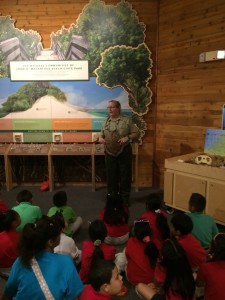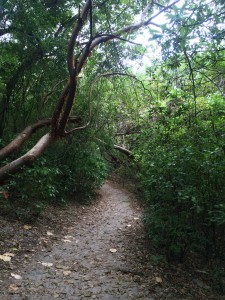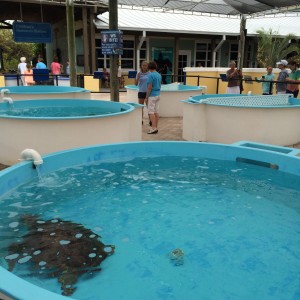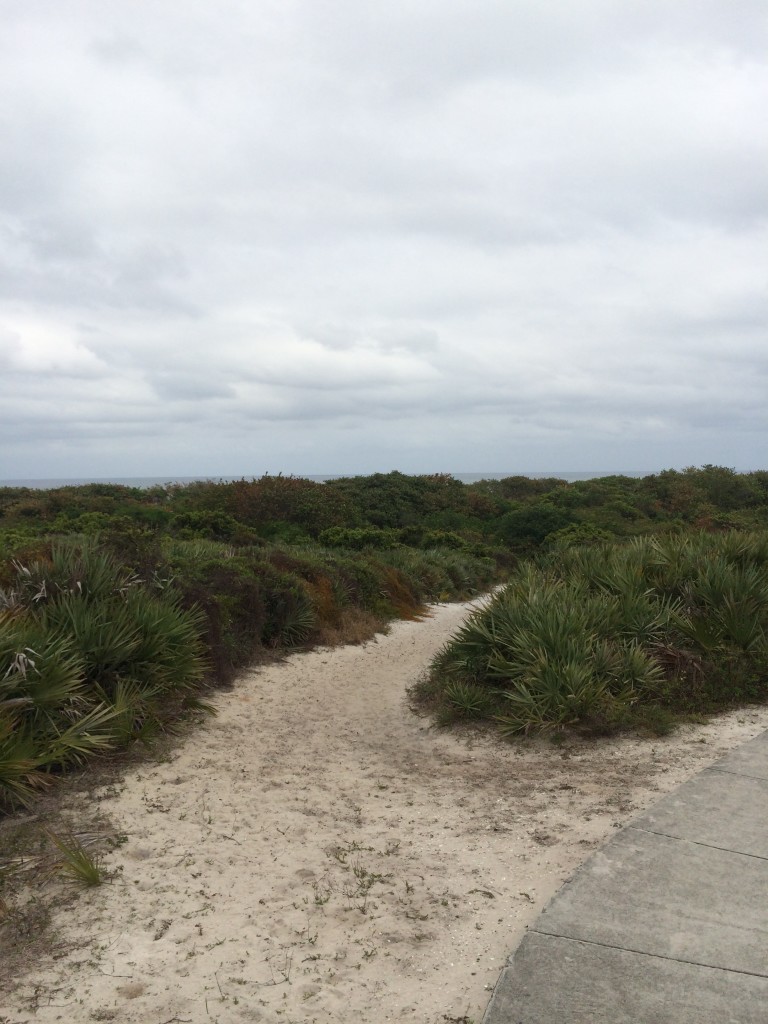April 18, 2014
Upon leaving the St. Lucie River waterfront community of Stuart, Florida, we traveled south on the ICW until we came to Lake Worth at North Palm Beach. The forecast offered no good weather window providing a safe crossing of the Gulf Stream to go to the Bahamas, so we found various ways to entertain ourselves while we anchored in the lake for four days.
The first evening we were in the Lake Worth anchorage, we went to dinner on our friend Stu’s boat. We, along with another couple, Paul and Peggy, with whom we were in a flotilla that went to the Bahamas last year, were invited to Stu’s sailboat for a pot luck meal. Stu had also been in the same flotilla last year, so we had a good time reminiscing. Joan, Stu’s friend, was a gracious co-host to the event.
On the second day, we borrowed Stu’s car and drove back home to Melbourne to pick up a few items we had forgotten. On our dinghy ride back to our boat, we stopped by Peggy and Paul’s boat to inform them of our return, and ended up staying to enjoy a drink with them. Peggy and Paul are not going to the Bahamas this year because their son will be getting married in June; so they decided to stay in Florida and cruise the Okeechobee water route to the West Coast of Florida. Gary and I want to make that trip someday as well, but this time, we desire to go back to the Bahamas.
Taking advantage of still having Stu’s car, Peggy and Paul joined us on an excursion to the John D. MacArthur Beach State Park in North Palm Beach, and also the Loggerhead Marinelife Center in Juno Beach, Florida.
At the J.D.M. Beach State Park we enjoyed the informative Nature Center.

These beautiful Lion Fish have invaded
US waters and threaten the environment. They will eat any native fish, and their spines are poisonous.
Upon leaving the Nature Center, we boarded the complimentary tram to traverse the board walk that goes from the nature center to the other side of Lake Worth Cove.
From there, we walked the remainder of the board walk, ending at the ocean. The overcast sky and comfortable ocean breeze offered a perfect day for our picnic on the beach.
On our return trip to the car, we walked a trail through a dense hammock. The Nature Center provided a brochure with a numbered, descriptive list of native trees and bushes, and along the trail were markers with the corresponding number for each tree or bush. Fortunately, Paul and Peggy are nature lovers as well, so they were not bored with our stopping to read each entry in the brochure as we observed the flora.
We learned a lot about various species of turtles at the Loggerhead Marinelife Center. All four of us were impressed at the extensive rehab area for injured turtles. Each turtle had it’s own little pool, and individual medical care.
Each turtle had an informational sign at their pool, informing guests of their name, where they were found, their diagnoses, treatment received, and what their present physical condition is.
One of the injured turtles, a Ridley turtle, had washed up onto one of the local beaches having come all the way from South America. The volunteer stated after the turtle recuperates, they will transport it back to it’s native waters of South America. These people are serious about taking care of the injured endangered sea turtles, with the goal of releasing them back into their natural habitat as soon as they have recovered.
Before leaving the Loggerhead Park, we walked one of the nature trails through the dunes. I expected sand dunes, but the dunes were lush with vegetation of varied indigenous plants, protecting them from the ravage of the ocean. The board walk led us to a lookout shelter where we could see out over the dunes to the ocean. We rested for awhile as we savored the view, before walking back to the car.
On our way back to our boats, we made one last stop to have dinner at a local restaurant, the Juno Beach Fish House. Good conversation flowed as the four of us enjoyed our delicious meals. The restaurant, with the comfortable bench seats, was a great venue to relax and unwind after a physically tiring, but delightful, day.
Stu had left his car for us to use while he was at his home, rather than on his boat. He still had not returned on the fourth day we were anchored at Lake Worth, so Peggy and Paul accompanied us on another excursion.
Our first stop was a prop shop to pick up Paul’s new propeller he had ordered after “they” (not Peggy specifically) bent their prop by getting out of the channel near one of the ICW bridges. Upon hearing of their dilemma, Stu recommended the prop shop to Paul, and fortunately they were able to order what Paul needed. Also fortunately, we had Stu’s car to go pick it up.
Next stop: Busch Wildlife Sanctuary in Jupiter, Florida. This sanctuary rescues and rehabs thousands of sick, injured, or orphaned wild animals each year. Their goal is to return recovered animals to their natural habitat. However, in some cases, it is not possible to do so. As is the case for two Florida panthers who had been declawed as pets but grew too large for the owners to keep them.











